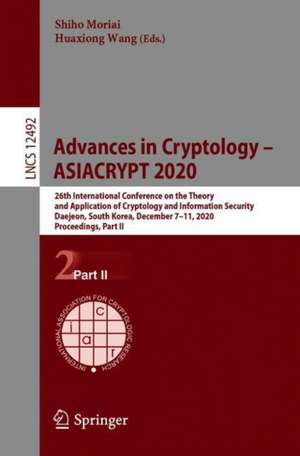Advances in Cryptology – ASIACRYPT 2020: 26th International Conference on the Theory and Application of Cryptology and Information Security, Daejeon, South Korea, December 7–11, 2020, Proceedings, Part II: Lecture Notes in Computer Science, cartea 12492
Editat de Shiho Moriai, Huaxiong Wangen Limba Engleză Paperback – 5 dec 2020
Part I: Best paper awards; encryption schemes.- post-quantum cryptography; cryptanalysis; symmetric key cryptography; message authentication codes; side-channel analysis.
Part II: public key cryptography; lattice-based cryptography; isogeny-based cryptography; quantum algorithms; authenticated key exchange.
Part III: multi-party computation; secret sharing; attribute-based encryption; updatable encryption; zero knowledge; blockchains and contact tracing.
| Toate formatele și edițiile | Preț | Express |
|---|---|---|
| Paperback (3) | 655.50 lei 6-8 săpt. | |
| Springer International Publishing – 5 dec 2020 | 655.50 lei 6-8 săpt. | |
| Springer International Publishing – 5 dec 2020 | 659.69 lei 6-8 săpt. | |
| Springer International Publishing – 6 dec 2020 | 660.66 lei 6-8 săpt. |
Din seria Lecture Notes in Computer Science
- 20%
 Preț: 1043.63 lei
Preț: 1043.63 lei - 20%
 Preț: 334.61 lei
Preț: 334.61 lei - 20%
 Preț: 336.22 lei
Preț: 336.22 lei - 20%
 Preț: 445.69 lei
Preț: 445.69 lei - 20%
 Preț: 238.01 lei
Preț: 238.01 lei - 20%
 Preț: 334.61 lei
Preț: 334.61 lei - 20%
 Preț: 438.69 lei
Preț: 438.69 lei -
 Preț: 442.03 lei
Preț: 442.03 lei - 20%
 Preț: 337.87 lei
Preț: 337.87 lei - 20%
 Preț: 148.66 lei
Preț: 148.66 lei - 20%
 Preț: 310.26 lei
Preț: 310.26 lei - 20%
 Preț: 256.27 lei
Preț: 256.27 lei - 20%
 Preț: 634.41 lei
Preț: 634.41 lei - 17%
 Preț: 427.22 lei
Preț: 427.22 lei - 20%
 Preț: 643.99 lei
Preț: 643.99 lei - 20%
 Preț: 307.71 lei
Preț: 307.71 lei - 20%
 Preț: 1057.10 lei
Preț: 1057.10 lei - 20%
 Preț: 581.55 lei
Preț: 581.55 lei -
 Preț: 374.84 lei
Preț: 374.84 lei - 20%
 Preț: 331.36 lei
Preț: 331.36 lei - 15%
 Preț: 431.22 lei
Preț: 431.22 lei - 20%
 Preț: 607.39 lei
Preț: 607.39 lei - 20%
 Preț: 538.29 lei
Preț: 538.29 lei -
 Preț: 389.48 lei
Preț: 389.48 lei - 20%
 Preț: 326.98 lei
Preț: 326.98 lei - 20%
 Preț: 1390.89 lei
Preț: 1390.89 lei - 20%
 Preț: 1007.16 lei
Preț: 1007.16 lei - 20%
 Preț: 569.54 lei
Preț: 569.54 lei - 20%
 Preț: 575.48 lei
Preț: 575.48 lei - 20%
 Preț: 573.59 lei
Preț: 573.59 lei - 20%
 Preț: 750.35 lei
Preț: 750.35 lei - 15%
 Preț: 570.71 lei
Preț: 570.71 lei - 17%
 Preț: 360.19 lei
Preț: 360.19 lei - 20%
 Preț: 504.57 lei
Preț: 504.57 lei - 20%
 Preț: 172.69 lei
Preț: 172.69 lei - 20%
 Preț: 369.12 lei
Preț: 369.12 lei - 20%
 Preț: 347.59 lei
Preț: 347.59 lei - 20%
 Preț: 576.02 lei
Preț: 576.02 lei -
 Preț: 404.00 lei
Preț: 404.00 lei - 20%
 Preț: 586.43 lei
Preț: 586.43 lei - 20%
 Preț: 750.35 lei
Preț: 750.35 lei - 20%
 Preț: 812.01 lei
Preț: 812.01 lei - 20%
 Preț: 649.49 lei
Preț: 649.49 lei - 20%
 Preț: 344.34 lei
Preț: 344.34 lei - 20%
 Preț: 309.90 lei
Preț: 309.90 lei - 20%
 Preț: 122.89 lei
Preț: 122.89 lei
Preț: 655.50 lei
Preț vechi: 771.18 lei
-15% Nou
Puncte Express: 983
Preț estimativ în valută:
125.45€ • 130.69$ • 104.30£
125.45€ • 130.69$ • 104.30£
Carte tipărită la comandă
Livrare economică 08-22 februarie 25
Preluare comenzi: 021 569.72.76
Specificații
ISBN-13: 9783030648336
ISBN-10: 3030648338
Pagini: 818
Ilustrații: XV, 818 p. 141 illus., 34 illus. in color.
Dimensiuni: 155 x 235 mm
Greutate: 1.15 kg
Ediția:1st ed. 2020
Editura: Springer International Publishing
Colecția Springer
Seriile Lecture Notes in Computer Science, Security and Cryptology
Locul publicării:Cham, Switzerland
ISBN-10: 3030648338
Pagini: 818
Ilustrații: XV, 818 p. 141 illus., 34 illus. in color.
Dimensiuni: 155 x 235 mm
Greutate: 1.15 kg
Ediția:1st ed. 2020
Editura: Springer International Publishing
Colecția Springer
Seriile Lecture Notes in Computer Science, Security and Cryptology
Locul publicării:Cham, Switzerland
Cuprins
Public Key Cryptography.- Incrementally Aggregatable Vector Commitments and Applications to Verifiable Decentralized Storage.- Non-Committing Encryption with Constant Ciphertext Expansion from Standard Assumptions.- Collusion Resistant Trace-and-Revoke for Arbitrary Identities from Standard Assumptions.- Subvert KEM to Break DEM: Practical Algorithm-Substitution Attacks on Public-Key Encryption.- Unbounded HIBE with Tight Security.- Multi-Client Oblivious RAM with Poly-Logarithmic Communication.- Privacy-Preserving Pattern Matching on Encrypted Data.- Efficient Homomorphic Comparison Methods with Optimal Complexity.- Lattice-Based Cryptography.- Practical Exact Proofs from Lattices: New Techniques to Exploit Fully-Splitting Rings.- Towards Classical Hardness of Module-LWE: The Linear Rank Case.- Lattice-Based E-Cash, Revisited.- Twisted-PHS: Using the Product Formula to Solve Approx-SVP in Ideal Lattices.- Simpler Statistically Sender Private Oblivious Transfer from Ideals of Cyclotomic Integers.- Isogeny-Based Cryptography.- Cryptographic Group Actions and Applications.- B-SIDH: supersingular isogeny Di e-Hellman using twisted torsion.- Calamari and Fala : Logarithmic (Linkable) Ring Signatures from Isogenies and Lattices.- Radical Isogenies.- Oblivious Pseudorandom Functions from Isogenies.- SiGamal: A supersingular isogeny-based PKE and its application to a PRF.- Quantum Algorithms.- Estimating quantum speedups for lattice sieves.- A Combinatorial Approach to Quantum Random Functions.- Improved Classical and Quantum Algorithms for Subset-Sum.- Security Limitations of Classical-Client Delegated Quantum Computing.- Quantum Circuit Implementations of AES with Fewer Qubits.- Quantum Collision Attacks on AES-like Hashing with Low Quantum Random Access Memories.- Authenticated Key Exchange.- Fuzzy Asymmetric Password-Authenticated Key Exchange.- Two-Pass Authenticated Key Exchange with Explicit Authentication and Tight Security.
